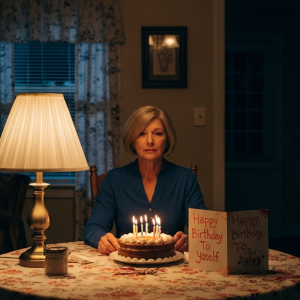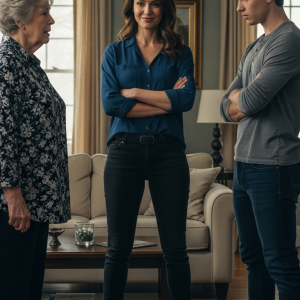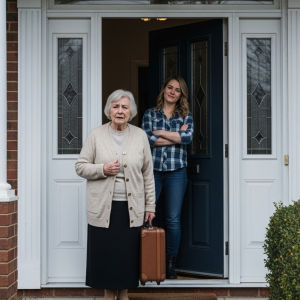Before we begin, imagine dedicating your life to someone who ends up treating you like a burden. This story isn’t fiction. It’s my truth, a truth I stayed silent about for too long. If you’ve ever felt unappreciated or invisible, stay with me. This isn’t just my story. It might be yours, too.
My name is Margaret Turner. For years, I lived in the quiet echo of my daughter Emily’s life. After I left her father—a man of quiet cruelty and simmering anger—I thought she would understand. Instead, she turned cold. She said I broke our family. She blamed me.
Still, I stayed close. When her own marriage crumbled, leaving her a single mother of two, I moved into the guest house behind her place. I became the silent, steady engine of her life: I cooked, cleaned, and drove the kids to school. I sat through fevers and science projects. I was their anchor.
But to Emily, I was just a convenience. “You baby them too much,” she’d snap. “They’ll never grow up right with you hovering.” I’d hear her on the phone with friends, her voice laced with casual disdain: “My mom? She’s basically free childcare with opinions. What can I do?” And I would stand in the kitchen, pretending it didn’t sting. Oh, but it did.
The day that changed everything started with a bone-deep exhaustion. The doctor ran tests, then more tests. Then he sat me down with eyes that tried to soften the blow. Cancer. Aggressive. I went home and waited three days to tell Emily, not because I feared the illness, but because I feared her reaction.
When I finally told her, she looked up from her phone, blinked, and said, “Oh. Well, we’ll figure something out.” A few days later, she added, “You should probably hire a nurse, Mom. I really don’t have the time for all that.” In that moment, with those flat, dismissive words, I stopped pretending. She didn’t see me. She saw a problem to be delegated. So, I picked up the phone.
The nurse arrived on a Wednesday. Her name was Lisa Coleman, a woman with kind eyes and a quiet strength that filled the room without demanding space. From the moment she stepped inside, something shifted. She didn’t treat me like a patient or a problem. She just saw me.
The first week, she handled my medications and meals, but she did more than that. She noticed things. She brought me warm socks without being asked. She refilled the bird feeder because “the view might cheer you up.” Little kindnesses that Emily hadn’t offered in years.
We would talk on the porch, and she would listen—truly listen—as I spoke about the garden I used to keep. “You should tell me which flowers to plant,” she said. “I’ve got the hands, you’ve got the vision.”
When Emily visited, she’d stand in the doorway, scrolling through her phone. “How’s the nurse?” she asked one day.
“She has a name,” I replied. “Lisa.”
“She’s wonderful,” I added, perhaps too firmly. “She takes good care of me.” Emily just pressed her lips into a thin line and left.
One evening, as I was spiraling in my own anxious thoughts, Lisa said gently, “You’ve carried a lot of people for a long time, haven’t you? You don’t have to keep holding everyone up. Let someone hold you for once.” That night, I cried—the deep, aching sobs of a lifetime of holding it all in. And for the first time, someone was there, and she didn’t look away.
The day I met with my lawyer, the air felt different. I was weaker, but my spirit felt a new kind of control. It was the same lawyer who had handled my divorce decades ago.
“You never updated your will after the divorce, Margaret,” he noted, flipping through old files.
“I know,” I said. “That’s why I’m here.”
When I told him what I wanted, he hesitated. “Are you sure? This isn’t a small change.”
“I’m sure,” I replied, with a firmness that surprised even me. This wasn’t about revenge. It was about acknowledging the truth of my life. My new will named my grandchildren as the primary beneficiaries, with education trusts set up for them. And I added Lisa. She would get the house and my savings. She had treated me with a dignity I hadn’t received from my own blood.
Emily showed up unannounced two days later, her posture radiating tension. “So,” she said, leaning against the fridge, “you’ve been spending a lot of time with the nurse.”
“Lisa,” I corrected. “Her name is Lisa.”
“Right. The kids said she’s been driving them to school. She’s probably spoiling them to get on your good side.”
I stared at her, the casual cruelty of her words a familiar poison. “Why would she need to get on my good side, Emily?”
“I don’t know. People have motives. Don’t be stupid about your money, Mom.” Stupid. After decades of cleaning up her messes, she called me stupid.
“Lisa hasn’t asked me for a single thing,” I said, my voice dangerously calm. “And in case you haven’t noticed, she is the only person treating me like I matter.” Emily scoffed and left, slamming the door behind her.
After that, the silence from Emily was a declaration of war. She stopped visiting, but she was busy. Whispers started circulating through the neighborhood. I heard Margaret changed her will. Gave it all to the nurse. That poor daughter, after everything she did for her mom.
She was painting herself as the victim and Lisa as the villain. The poison seeped into my home. My grandchildren started pulling away, their eyes filled with a confusion they couldn’t voice. “Mom said you’re mad at her,” my grandson mumbled one afternoon. “She said Lisa’s stealing our house.”
That accusation hit me harder than any insult. I saw the toll it was taking on Lisa, who began to retreat into herself, her quiet kindness now edged with sorrow. Emily’s war wasn’t just against me; it was against anyone who gave me the love she refused to offer.
Then came the legal notices. A formal request to verify the validity of my will. A petition claiming I had been “unduly influenced.” Emily was trying to prove I was incompetent, a pawn in a gold-digger’s scheme.
One morning, I found Lisa crying quietly in the laundry room. “I never wanted this,” she whispered. “I just came to help.”
“And you did,” I told her, my heart aching. “More than you know.”
That night, Emily appeared again, her face a mask of fury. “You don’t see it, do you?” she seethed, standing over me. “She’s isolating you. She’s made you believe I’m the enemy.”
“You made yourself the enemy, Emily,” I replied.
“I am your DAUGHTER!”
“And I am your MOTHER,” I said quietly. “A mother you have taken for granted your entire adult life.” I watched the hatred in her eyes, and I knew it wasn’t just about the inheritance. It was about control. “If you keep attacking the people who love me,” I warned, “you won’t just lose the house. You’ll lose me.” She slammed the door, and this time, the warning shot was clear.
The moment everything cracked open came with footsteps, heavy and intentional. The front door burst open. Lisa was out on an errand.
“Where is she?” Emily’s voice cut through the air. She stormed into the living room, her eyes wild. “I swear to God, Mom, if I see her again in my house—”
“This is not your house,” I cut her off. The words hung between us like smoke.
She froze. “What did you just say?”
My body trembled, not from weakness, but from a lifetime of swallowed rage. “You don’t live here,” I said calmly. “You don’t get to barge in. You don’t get to threaten the only person who hasn’t abandoned me in months.”
“She’s using you!” Emily screamed.
“No,” I said, rising to my feet, my voice low but firm. “She’s caring for me. Something you stopped doing a long time ago.”
She took a step back, stunned. “You come here like a storm,” I continued. “You throw accusations, you spread lies, and for what? Because I finally chose to be cared for with compassion?”
“She’s not family, Mom!”
I didn’t raise my voice. I didn’t need to. “Neither are you anymore.”
That broke her. The fury in her face crumbled, replaced by a raw, wounded disbelief. “You’ll regret this,” she whispered, turning and walking out. The door slammed, and for the first time in a long, long time, I didn’t flinch. When Lisa returned, she found me sitting in the silence. She didn’t ask what happened. She just sat beside me. “I think she hates me now,” I said.
“She doesn’t hate you,” Lisa replied. “She just hates that you’re not under her control anymore.”
The cancer spread. By late summer, my body was a fragile collection of bones, but my spirit felt anchored. The grandkids began visiting on their own, quiet and tentative, their loyalty torn. One afternoon, my youngest granddaughter slipped a drawing into my lap: a picture of me and Lisa, with the words “My Two Grandmas” written in crayon. I wept, not from sadness, but from the simple, profound truth of it.
Then one Sunday, Emily returned. There was no makeup, no designer handbag. Just her, and a small, weathered envelope. “A letter,” she said, her voice raspy. “From Dad. One I found after he died.”
My hands trembled as I read his unmistakable handwriting. In it, he admitted everything: his cruelty, my reasons for leaving. He told Emily that I had done the right thing and that she needed to forgive me.
Tears slid down my cheeks. Emily was crying too. “I blamed you because it was easier than blaming him,” she whispered. “And then I just kept doing it. Now… now I know I failed you.” The pain in her voice was real.
She turned to Lisa, who had entered quietly. “I was wrong about you,” Emily said. “I let my pride and fear run everything.”
That day marked the closing of a long, painful chapter. Emily started visiting again, not with demands, but with offerings: a cup of tea, a warm scone, a quiet presence.
“I know things can’t go back to how they were,” she said one afternoon.
“They shouldn’t,” I replied gently. “But that doesn’t mean they can’t move forward.”
“I don’t deserve your forgiveness,” she whispered.
“You don’t,” I said honestly. “But I’m giving it anyway. Because forgiveness isn’t about freeing you. It’s about freeing me.”
She helped Lisa in the kitchen. They moved in a new, fragile truce. I took out the updated will, looked at it one last time, and didn’t change a thing. The decision had never been about punishment; it had been about truth. My legacy would be what I left in the hearts of those who loved me out loud.
That night, I wrote a letter to myself. I wrote that I was proud of the woman who finally said enough, the woman who stopped asking to be chosen and chose herself instead. The story didn’t end in revenge. It ended in freedom. And that, after everything, was more than enough.
The autumn that followed was a season of careful choreography. Emily began to visit not as a storm, but as a tentative guest in a house that was once the backdrop of her entire life. She would bring groceries she wasn’t sure I could eat, or flowers for vases that Lisa had already filled. There was an awkwardness to her presence, a quiet dance of uncertainty around Lisa, who remained gracious and steady.
Emily would try to help, fluffing my pillows or offering to make tea, but her hands seemed to have forgotten the familiar rhythms of the house. More often than not, she would end up watching as Lisa seamlessly managed my medication, prepared a meal I could tolerate, or simply adjusted my blanket with an intuitive gentleness that couldn’t be taught. I saw the flicker of pain in Emily’s eyes during these moments—the dawning realization that she was no longer the primary caregiver because she had abdicated the role long ago.
Lisa, for her part, created space for Emily. She would find reasons to step out, to give us moments alone. She never mentioned the legal battles or the harsh words. She treated Emily with a quiet, professional respect that was, in its own way, a profound act of grace. Lisa was not just caring for me; she was tending to the fragile ecosystem of our broken family.
I watched this slow, painful recalibration from the quiet of my armchair. I saw my daughter struggle with the unfamiliar weight of humility. I saw her learning to be present without being in charge, to listen without agenda. She started talking to me, really talking, not about her problems or her schedule, but about memories, asking questions about my life before I was just “Mom.”
One crisp October night, the fragile peace was tested. A sharp, searing pain shot through my chest, stealing my breath. I slumped over in my chair, unable to speak. Emily, who had been quietly reading in the corner, panicked. Her eyes went wide with fear, her hands fluttering uselessly around me. “Mom? Mom, what is it? What do I do?”
Lisa entered the room, took one look at me, and her training took over. She was a study in calm efficiency. “Emily, call 911 now,” she commanded, her voice firm but not unkind. As Emily fumbled with her phone, Lisa was already at my side, checking my pulse, administering a dose of emergency pain medication from the kit by my chair, and speaking to me in a low, soothing voice. “It’s okay, Margaret. I’m right here. Just breathe with me.”
By the time the paramedics arrived, the worst of the pain had subsided into a dull, throbbing ache. They stabilized me, their questions and movements a blur. Through it all, I watched Emily standing in the doorway, pale and shaken. She had been rendered a bystander in her own mother’s crisis. She saw, in that stark, terrifying moment, the difference between love as a feeling and care as an action.
After the paramedics left, confirming it was a severe complication but not immediately life-threatening, a heavy silence filled the house. Lisa was cleaning up, her movements deliberate. Emily finally sat down in the chair across from me, her face etched with a shame that was deeper than guilt.
“I didn’t know what to do,” she whispered, her voice cracking. “I’m your daughter, and I just… froze. She knew exactly what you needed.”
“Lisa is a nurse, Emily,” I said gently. “It is her job to know.”
“No,” she insisted, shaking her head. “It’s more than that. She pays attention. I haven’t been paying attention for years.”
We sat in that shared, painful truth. It was then I knew we could finally have the conversation that needed to happen.
“The will is not going to change,” I said, my voice quiet but firm. She flinched but didn’t argue.
“I know, Mom. I don’t expect it to.”
“I need you to understand why,” I continued. “It is not a punishment. It is a statement of fact. This house, this money… they became a symbol of what you thought you were owed. But your real inheritance, Emily, is not in my bank account. It’s the lesson you are learning right now. It is the chance to be a better mother to your own children than you were a daughter to me. It’s the time we have left, however much that may be.”
Tears streamed down her face, but for the first time, they were not tears of anger or self-pity. They were tears of grief for the years she had wasted, for the bond she had allowed to wither. “I understand,” she said, her voice choked. “I just want to be here now. Please, just let me be here.”
From that day on, something fundamental shifted. Emily stopped trying to do and started learning to be. She would sit with me for hours, sometimes reading aloud, sometimes just holding my hand. She began talking to Lisa, asking questions not as a suspicious interrogator, but as a student. How do you know when she needs her medication? What foods are easiest for her to digest? She was learning the language of care she had never bothered to speak.
One afternoon, I asked for the old photo albums. I wanted to put names to the faces for my grandchildren, to write down the stories before they faded completely. I asked both Emily and Lisa to help me. The three of us sat on the floor, surrounded by a lifetime of memories.
At first, it was tense. But as we moved through the pages, the frost began to thaw. Emily pointed to a photo of herself as a gap-toothed seven-year-old. “I remember that day,” she laughed. “You spent all morning trying to teach me how to ride that bike, and I just kept falling.”
“You were always stubborn,” I smiled.
Later, Lisa picked up a more recent photo, one of me in the garden just before I got sick. “This is how I first pictured you,” Lisa said softly. “Before I ever met you. I saw your garden from the street and thought, ‘Whoever lives here loves beautiful things’.”
In that moment, sorting through the artifacts of my past, they found a small, shared patch of present ground. They were not rivals, nor were they quite friends. They were two different women bound by their love for a third. My grandchildren came in and joined us, and the room filled with questions and stories.
I leaned my head back, the sound of their voices washing over me—Emily’s laughter, Lisa’s quiet interjections, the children’s curious questions. Emily was no longer the sole heir to my possessions, but she was finally reclaiming her place as the heir to my history.
I realized then that my legacy wasn’t the house Lisa would inherit or the trusts the children would receive. My true legacy was this moment: a broken family learning to piece itself back together, not as it was, but as it could be—forged in the fires of honesty, humility, and a love that had finally learned the difference between obligation and devotion. And for the first time, I felt truly at peace, ready for the quiet that awaited me.




